#after finishing my last fmab rewatch i was thinking a lot about the ending if you couldn’t tell fjfhfh
Explore tagged Tumblr posts
Text
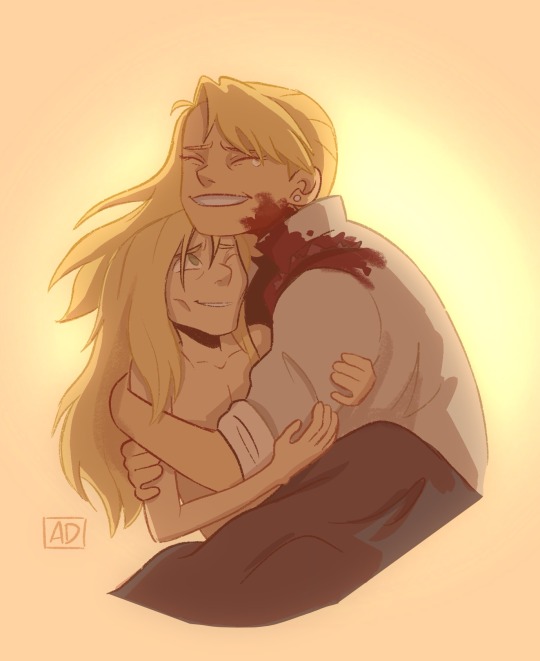
#do you ever just#think about riza getting to see al in the flesh for the first time#after finishing my last fmab rewatch i was thinking a lot about the ending if you couldn’t tell fjfhfh#anyways im still crying#fma#fmab#fullmetal alchemist#fullmetal alchimist brotherhood#fma fanart#riza hawkeye#alphonse elric
888 notes
·
View notes
Text
tagged by @patron-saints and @rizaposting 💕 thank you friends 😘
are you named after anyone? kinda? My mom chose my name because it's a mix of hers and my aunt's. I also share a middle name with my mom
when was the last time you cried? I tear up a lot if I'm reading or watching something (just finished my fmab rewatch and alphonse saying hoho's hand is warm always gets me) but it's been a bit since I've had an actual cry. It's unfortunate because oh man could I really use a good one.
do you have kids? no but hopefully someday (soon 😅) I want them very badly
do you use sarcasm a lot? yes. deadpan, too, so people just think I'm kind of a bitch (and they're probably right 🤷��♀️) I'm working on it
what sports do you play? I like hiking and I work out sometimes but no sports :( if I was better at tennis I'd probably play that a lot
what's the first thing you notice about people? eyes probably
what's your eye color? 💙
scary movies or happy endings? I'm more of a happy ending person but it's gotta feel earned
any special talents? my special power is that I always come back to a download or whatever when it's at 69% finished
where were you born? SoCal babey 😎🌊
what are your hobbies? I just like to make things! art, writing, sewing, cooking - you name it, I like to do it!
do you have pets? yes! my two dumb birds Guts the cockatiel and Beebo the green cheek 💕 and I'm counting Baby Onion even though she's my roommate's cat. I also have a few shrimp and a cute little jumping spider
how tall are you? 5'8"
favorite subject in school? I really enjoyed history, esp in college
dream job? I always really wanted to engineer/design prosthetics for people. If I could redo things I'd probably try to apply myself more to go either into that or to become a surgeon. As it stands I'm not cut out for it lol
Or, I'd love to get into tattooing and maybe just travel around doing tattoos for people 💕
Tagging @kazsama @dreadfutures @aicasey @wingsofescape @rowanisawriter @terminalberserker and anyone else who'd like to do this ☺️
#tag games#i feel like i might be talking about myself too much recently lol#shutting up now. back to your regularly scheduled queue 🫡
28 notes
·
View notes
Text
yes i like fullmetal alchemist brotherhood a normal amount (<- lying) this post is going to be long so open the readmore at ur own risk
ok this is genuinely going to be a mess because im really terrible at summarizing things and organizing my thoughts so if ur actually gonna read through this then good luck!
here are just some short thoughts before the longer paragraphs
- i absolutely LOVE the note that plays right after the alchemists clap their hands together that indicates that theyre abt to use alchemy. the sound of the clap + the note that plays is incredibly satisfying
- the strong and well-written female characters in this show was a really good touch and i loved how they brought them (izumi and olivier) together at the end :') also their beefy husbands together was super nice too
- my favorite part of the story was actually the part where ed and al go to briggs because thats wher they introduced olivier. it was super nice to see her talk about how strong-willed she is and her army and all of that
- lan fan is another example of a strong female character but a little less favorable since she serves ling yao. that doesnt make her any less cool though she was super badass and i definitely cried over her more than once
- the details in this show was really nice. alphonse's body being malnourished was something that seemed really obvious, but the fact that when ed got his right arm back it was noticeably less muscular and had longer nails than his left was such a good detail
- in the last episode there was a scene where alphonse made a dumb face that was animated just like how ed's faces looked and that made me really happy that we finally get to see al emote just like his brother :')
- im pretty sure i cried through the entirety of the last episode because being able to see the characters laugh and smile without feeling burdoned by anything after youve seen them go through repeated heartache and physical pain for 63 episodes is a super nice feeling
- "i'm a terrible father but i want to make you two proud" .
- "i'll give you half of my life and you give me half of yours" UGH
- also right after this when ed was laughing at how flustered winry got because normally hes the one who gets flustered :') that was so sweet
- i literally guessed that it was morse code whenever they showed selim banging on al's head because its like why would they put so much emphasis on that and let it go on for like 10 seconds without any music over it. this happened like multiple times too and i guessed it before they made it incredibly obvious bye im the smartest guy alive
ok heres where i talk more besties lets go
fmab was absolutely worth watching 64 episodes. i was convinced that i probably wont finish it because i have trouble finishing 12 episodes but as it may be obvious i got super invested. fmab being this long allowed there to be enough time to explain aspects of the story separately and to watch them all come together at some point. it also allowed for a ton of details that even though they're small, they're still important to the story. they rehash a lot of points because it was a simple detail that could get lost through the story but when its rementioned and you recall the time, it's such a nice feeling to have that click in ur mind.
also the character development was really good and ill get more in-depth about characters later but the length of this anime also allowed for a ton of really good character development. it ties into the whole thing where you learn about a characters backstory and you don't understand why it's important to the show until later on and then you're like ohhhh holy shit that makes sense now! also all that time for character development also lets you get attached to more than just the main characters and makes you care more about the role they play in the story.
roy mustang. at first i liked him, but when he started to speak about how he wanted to become the fuhrer president before he knew the military was corrupt, i assumed that he would just become as corrupt as bradley was ("starting wars for no reason"). i was convinced for the longest time that he would eventually just turn out to be the second bad guy and that nearly came true whenever he was trying to kill envy but riza helped him :) i loved the entirety of their relationship they're so sweet and compliment eachother so well. the scene where roy demonstrates the sheer amount of trust he has in riza's abilities by blindly (heh. he was blind during this if u didnt know.) following her directions and hitting their target ... it was just so good. also even though i didnt trust roy i thought he was super badass the sound of him snapping was always super satisfying as well
i almost want to rewatch fmab because it would be really nice to pick up on things that were later referenced in the anime. because of how long it is, its super easy to forget about things that happened early on in the anime (especially for someone with memory issues lol) so being able to watch back with the second half of the show still fresh on my mind would be almost an entirely different experience. the first thing that comes to mind is whenever we were shown kimblee in prison super early on. i know he had dialogue but i remember nothing about it because i was focused on thinking "literally who the fuck is this guy lol" but now i know. wow.
edward elric. im aware that this is going to be incredibly biased but i literally do not care. anyways. character development is always important and needed within a story but i genuinely feel like ed's character development was interesting to watch. it was never super obvious and his core values never changed. he did somewhat have a change in attitude when he nearly died to kimblee, but thats like expected you know ... being that close to death and all. i think that event was essentially the beginning of the end of his naivety. he was always consistent with the people he cared about though :) he never stopped calling them stupid and weird and he never stopped threatening to punch hohenheim whenever he was frustrated even if they were like in the middle of like a life or death situation. i just think he's neat
when ed destroyed pride('s vessel) i felt my heart well up with. pride LOL. that was his very first explicit win against someone who has been against him this entire time, and seeing him defeat pride with his own two hands was such a nice feeling. it wasnt technically his own win since he was only able to get to that point because of his friends and family around him
episode 60 was suuper good it was the part where the father was gonna swallow god because of the solar eclipse. its super hard to explain if uve never seen it but basically the scene was super cool simply because of how well the animation showed the sheer scale of what was happening. like this guy was literally reaching to the moon. theres a lot of unnatural things that are shown in fmab and although this scene didnt introduce any new concepts, it was still incredibly captivating because of how well the animation was
aand thats it i think! i regret not writing down how i feel during the earlier episodes but i think watching it with little to no distractions was a better experience. if u actually read this im giving u a kiss on the cheek rn ilu
#i dont expect anyone to read this btw this is purely for myself#i hate proofreading shit so dont look at anything too closely
12 notes
·
View notes
Text
Listing my favorite animes (because I’m jumping on the bandwagon)
❗️⚠️ *spoilers!! (Duh)* ❗️⚠️
5. Deadman Wonderland
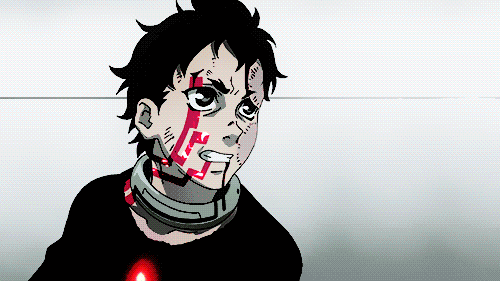
I was really really sad when I found out this anime got cancelled. The music was fantastic, the animation was really good, and the voice acting was incredible. Even the fucking dubbed version (I loved the voice they chose for Senji. God he was hilarious). I binged this show so fucking fast it wasn’t even funny. I loved watching the characters go through their own struggles and grow as people in the very small amount of episodes provided. There was a lot of development within the snippet that we actually saw, and I was thoroughly impressed with how well it was done. I wanted to scream or something when I found out there wouldn’t be a second season.
Sigh. Oh well. At least we got some of the manga’s masterpiece translated into a show, even if we were missing some fucking awesome characters.
4. Guilty Crown
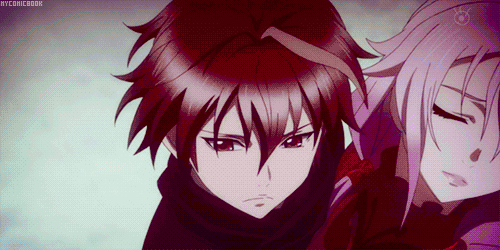
Ugh, don’t even get me started. This anime was beautiful and I got so invested so freaking quickly. I literally go back every few years to rewatch it because I get ship starved.
Shu and Inori’s story was so beautifully done; between Shu uncovering his courage and Inori’s journey of self-discovery, I was continuously awe-struck and filled with feelings—I mean, I had never felt such raw emotion while watching something and I was completely blown away by the affect it had on me. Anger, hatred, sadness, it was all there (even for the main character lmao) and it was one of the first times I had ever felt a ship so heavily that I literally cried at the end. It was one of the very first Animes I’d ever seen and was one of the reasons I got such a taste for them. Thanks for throwing me down that rabbit hole, GC.
3. Soul Eater
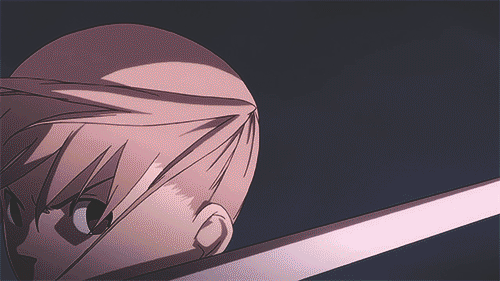
This was literally the first Anime I’d ever seen, and my god I couldn’t have asked for a better starter. What I like about this one is that it’s style is so unique and different. It’s very punk and grunge, something I admired and appreciated in a genre that is normally the opposite (like Guilty Crown, for example). Also the fight scenes were badass, like holy shit just look at that gif ??? Freaking amazing.
I loved the way the show transitioned from light hearted to intense and adrenaline pumping so effortlessly. That can be said about a lot of shows, but this one went from *haha cute show* to *holy shit, like they’re actually gonna die ohmygod howaretheygoingtosurvivethis* so smoothly I was genuinely surprised. They made one of the main villains actually cool and each character had their own beautifully done arc. I loved and adored how the show solidified and expanded on the different friendships/relationships that were involved—specifically Soul and Maka’s (also, holy shit, Stein’s arc? Fucking prime, dude). There was a lot of growth in each and every friendship (CRONA!!!), and that really pushed the viewer to invest in the individual characters.
I am fucking delighted that this was my first anime, and (though the ending was a little anticlimactic) it remains one of my top favorites to this day. It set the bar pretty fucking high, and for that I am extremely greatful.
No one asked for Soul Eater: Not! It is the unspoken sin of the Soul Eater world (then again, it is called Soul Eater: Not!)
2. Fullmetal Alchemist: Brotherhood
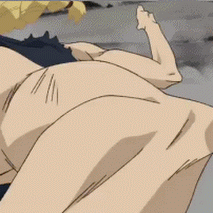
If you have been following me for a while, then you are no stranger to my love of FMAB. Some of my most popular posts are about this anime, and for good reason.
Unfortunately, I was late to the party. I actually didn’t watch this until last year, but got invested really damn quick. I have a tendency to be extremely picky about the animes that I watch/like (which is why NONE of these shows are that recent), to the point that I will literally research them before I start watching (a bad habit, do not copy me). I have an incomparably hard time finishing a show when I start, because I get bored really quickly, but this was an exception. I started watching and I just... didn’t stop. I spent a straight week watching FMAB, gobbling it up during any small amount free time I could manage, and finished it before I even knew what happened. I wasn’t picky about it, I didn’t research it, I just dove right in and gosh, I was not disappointed.
The subtle romance that was alluded throughout the entire show was super cute, the devotion the brothers had for each other was to die for, and the struggles that each person went through was more than moving. I never once found myself bored while watching, and that’s saying a lot for my adhd ass. I was invested in each and every second of that damn anime and I was never, ever left underwhelmed. That probably had to do with the fact that every. Single. Character. Had a purpose. I’m not even kidding. Every single person contributed to the big fight at the end and that alone is fucking fantastic.
Not to mention ALL the women, every female character, was a badass bitch. None of them were reduced to sex appeal or romantic subplot, they all had real feelings, real arcs and real, unadulterated badassery that I thoroughly admired and appreciated. I could watch this anime over and over again every single month and I wouldn’t get bored. Between the emotional struggle, self discovery, and personal development of each character, I promise you will not see a lack of plot or meaning here. The more you watch, the more you discover and that is not a lie. There are so many layers to its story, which only makes me wish I had watched this sooner.
There is nothing I have to offer in the ways of criticism, and for that I couldn’t be happier. Thank you, Hiromu Arakawa, for such an incredible piece of art. You deserve every bit of love that this manga/anime gets. You go girl.
1. Cowboy Bepop
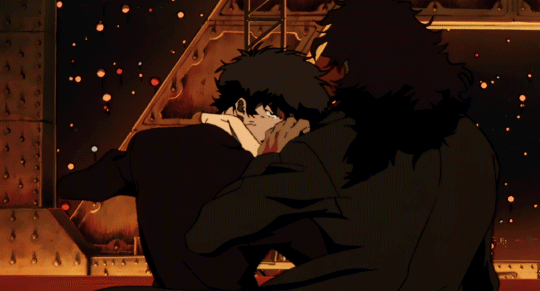
Holy shit holy shit holy shit this anime is so fucking good and it has been my favorite for so damn long. I have been watching anime for years, and while some of the shows in my list have moved around, this one has yet to be bumped down from the top (and I doubt it ever will). There’s a reason it became such a cult classic.
For starters, the animation. I mean, just look at Spike and the way they animate his fighting (yes I am aware that this gif is from the movie, but that still doesn’t change my point). The sequences in the show/film have been reused in many other shows and for good reason. It’s good, incredible, actually and they make him look so badass with just a few hand movements. I was consistently impressed with the way the fight scenes were portrayed and wasn’t ever left underwhelmed or disappointed (or, for that matter, feeling like they completely over exaggerated/overcompensated the scene with huge close-ups and tons of debris and lights). I loved watching this and my heart was always pounding with every intense interaction. I didn’t feel bored during any of the episodes and always found myself laughing when they cracked a joke—pretty much all of their funny lines hit and that’s saying something, dude.
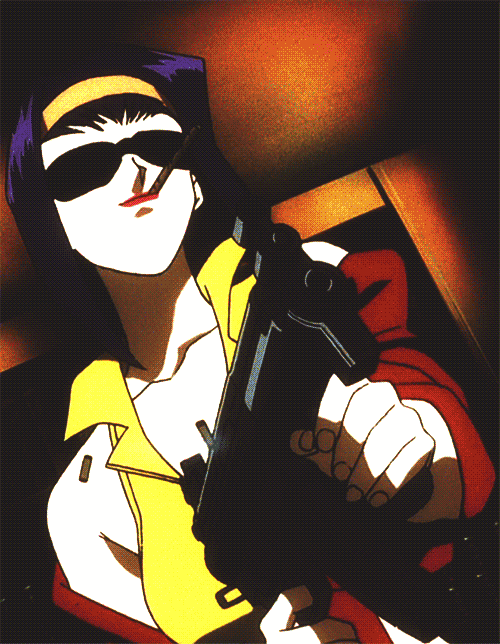
The show, while having a lighthearted surface, has a heavy meaning that you don’t see at first glance. It’s about dealing with grief and loss, and how the characters themselves accomplished that in different ways. The most prominent quote is the biggest indication of its moral “you’re gonna carry that weight”. Basically: ‘You’ve gotta pick up your baggage, because the world moves on, with or without you’. Or ‘You’re going to carry that weight whether you like it or not, because life keeps going’. When I figured out the show’s actual message, while staring at my ceiling in the long hours of the night, I almost cried. This realization brought something entirely different to the table, a new understanding of the show’s characters and overall essence.
The main characters, all of them, had depth. They had real, palpable depth, and even if you didn’t want to care you found yourself seriously interested in their lives. Each of them had relatively shitty pasts. Faye with her lost memories, Spike with Julia and the people who fucked him over, Jet with his old flame and the ISSP, Ed and her/his father... throughout the entire show we got to see how all of them dealt with these things, whether they wanted to continue on with life or not. The way they portrayed it was engaging, because the characters individual, contrasting journeys weren’t repetitive or one note. The beauty that the show holds so achinging close to its core, the layers of grief that the characters are wrapped in so delicately is almost suffocatingly real—because they’re all different. It’s something you discover when you think on the subject in a deeper light, which is another reason why I enjoy it so much. It has both a surface story and a deeper one. You can either take the show at face value or choose to understand the underlying moral.
This show inspired my very first, thoroughly fleshed out OC, and continues to inspire me to this day. It has contributed to my own personal growth, and has helped push me to continue my art and writing. It is beautifully written, beautifully executed and even though some of the episodes seem like filler, it has never disappointed me. I rewatch it all the time because there’s something so infinitely refreshing about the beauty of this anime, whether it be the way we watch the characters develop or the overall moral it portrays. This show has given us a message that is essentially timeless, it can be ‘carried’ through generation after generation, and still have the same impact—something I absolutely fucking adore.
I owe so much to this anime, including my very own artistic development. I discovered it during a really shitty time in my life and I couldn’t have asked for better timing. I will never tire of the bittersweet message or the thoroughly fucking fantastic animation. Everyone who contributed to this masterpiece deserves love, because it’s seriously fucking gold.
#deadman wonderland#ganta igarashi#shiro#soul eater#soul eater evans#maka albarn#blackstar#tsubaki nakatsukasa#death the kid#liz and patty#franken stein#crona#guilty crown#shu ouma#inori yuzuriha#fullmetal alchemist: brotherhood#edward elric#alphonse elric#cowboy bebop#spike spiegel#faye valentine#jet black#edward wong hau pepelu tivrusky iv#ein#anime#anime aesthetic#anime gif#fmab edwin#inori and shu#soul and maka
246 notes
·
View notes
Text
FMA 2003 Anime First Runthrough Thoughts
So people saw, in the last few weeks, me liveblogging my first runthrough of the 2003 Fullmetal Alchemist anime. I still have yet to finish the story by watching Conqueror of Shamballa, but before I do so and before I forget to do so, I’m going to post some of my thoughts - more coherently - about the 2003 series.
There are lots of angles I could look at, both pros and cons, and certainly all have points to talk about in length. I’m not going to go into everything now, though. What I’m writing here are some of the biggest first impressions I take from the 2003. Here I’ll mainly write a list of analytical qualifications of how FMA 2003′s storytelling structure differs from Arakawa’s - and consequently how the 2003 anime comes across (to me) as less effective. None of this is in disrespectful criticism of the 2003, which I did end up enjoying enough I’ll potentially do a rewatch (and some episodes I adore so much I actively recommend them to others, too). This is just for me to reflect, in fascination, at how 2003′s different writing choices create some different results and effects.
My response would be better nuanced and FAR more accurate with a second watch through, of course. So don’t take everything I say as a concrete, flawless handling of the topic. We don’t catch everything structurally and informationally the first time watching something, and a story feels different the second time through. However, these are points I take from a first run through regarding (what I feel to be) the odd, limited efficacy of the 2003:
FMA 2003 has an overall grimmer take on reality and achievement. How events unfold and how characters respond in the 2003 show a different level of cynicism versus motivational optimism than in FMAB / the manga. What moral lessons are expounded upon and taken away from has a huge effect on mood. Furthermore, to what extent characters achieve their goals, and feel satisfied with that, and how much characters receive a happy ending... plays into this overall mood difference between 2003 and 2009 / the manga.
FMA 2003′s pacing doesn’t have as much drive. This is due to several factors, like how much time is spent focusing on equivalent materials (ex: one versus two episodes in Liore with Father Cornello), how many filler episodes there are, and how pacing is weighted. FMA 2003 and FMAB have opposite pacing weights. The 2003 anime has a slow start and a faster end, whereas FMAB has a fast jump start but is climax heavy at the end. All of this results in FMAB having a much smoother flow and exciting build, whereas FMA struggles with momentum.
Arakawa is extremely solid for logical clarity, explanations, and follow-through - be it in why events happen in the story, or how clear the story feels to us audience members. Explanations, clarity, and follow-through of various points is more convoluted and inconsistent in the 2003.
So, to talk about it in more detail:
I have downright adored Hiromu Arakawa’s Fullmetal Alchemist storyline for almost a decade now and believe she has captured one of the most brilliant stories ever told. With the 2003 anime, it’s interesting to see creators take material just from the start of her writing and attempt to finish that story separately from her. There are some cool elements to it - the idea of the homunculi being created from failed human transmutation experiments is rather clever, for instance. But there are also some things which make the anime’s story less clean, directed, and powerful as what Arakawa does.
The writers don’t handle explanations and follow-through as well in FMA 2003. By “follow-through” I mean continuing storyline elements forward or using details from past episodes to build material in future episodes. So, if someone completely forgets to follow through on information, then plot threads are left hanging. FMA 2003 doesn’t usually leave threads hanging, but it’s like the story neglects to braid threads together evenly. This results in story threads feeling like a machine spurting on and off, material being less explained, story arcs being awkwardly handled, and the plot as a whole containing more logic holes.
It’s easy to talk about this with some examples. For instance:
Mustang assassinated the Fuhrer in an overt enough manner to be accused, and even if he and Hawkeye had managed to kill all nearby security, reports would have made it to other military personnel. In fact, reports of the event were how Archer got onto the scene to try to halt Mustang. At the LEAST, Roy would be obviously suspected of killing Bradley due to heavy lacerations across his body (plus wouldn’t an ambulance show up at Bradley’s location to take him to the hospital, showing where Mustang was at the time of the event??). And there would be other manners in which Mustang could be put in a position to be incriminated.
Edward said that Mustang could never be a leader again because he couldn’t get people behind him. Bradley himself said Mustang could never again hold a leadership position after assassination. And yet not only does Mustang have no seen dirt on him at the end of the anime, but he retains his high military rank - not even a demotion for disobeying orders, subverting northern troops, and killing the nation’s leader.
(Note: I know he drops in rank in Shamballa, but I hear that’s due to choice, not repercussions of the assassination - by the end of 2003 when he’s recovering, he’s still got his high rank. He gets off clean for literally murdering the country’s most powerful individual).

In fact, you have to wonder how everyone gets off the hook. It’s not like I’d expect them to pin down Havoc specifically impersonated Mustang, but higher-ranking officers like Alex Armstrong led troops to attack Central and that can’t be denied. Why is Alex stepping off free? For all this story focuses on the concept of equivalent exchange and unpleasant consequences, this story sometimes drops odd logic holes on the responsibility front.
Did you even notice Ed accepts Hohenheim as his father at the end... without obviously emotionally working through all the grits of Hohenheim’s backstory and information regarding Philosopher’s Stone creation? There might have been something here to explore the consequences of. It’s like Ed almost accepts his father more effortlessly in London after hearing Hohenheim’s worst side and past... than he does at the start of the story reuniting with Hohenheim.
The truth is that follow-through throughout the anime is uneven. The strangeness of the Elric brothers’ missing father gets hit hard in the starting episodes, gets dropped completely off the radar, then at once cumbersomely, in full force, is relevant again. That plot thread is neither paced nor juggled well. There’s a difference between hitting key moments to progress and build a plotline throughout, versus jumping in and out of the concept to the point it feels sporadically addressed. Many things get turned on and off like light switches. Mustang’s trauma with the past is something that gets hit heavy, dropped, and feels like it’s an on-off light switch several times... until the end where they retroactively discuss some (though not all) of the issue. Even things as major as the Ishvalans’ plight just disappear after Liore. What happens to the Liore refugees upon escaping? With Amestris still being an aggressive military power in a state of widespread racial discrimination, who decides to reverse Ishvalan policies? Why? There is no development, explanation, resolution - just a quick, vague comment at the end of the anime giving an unexplained positive nationwide social turn.

And these sorts of starts and stops and off-balanced jugglings of plots happen all too frequently in 2003. Interweaving of ideas doesn’t feel well-braided... more like a braid with uneven strands, some thin, some fat, some loosely pulled together, some clumps forgotten, some tightly cinched together. Things are connected in FMA 2003, yes, and sometimes in cool ways, but the presentation can be imbalanced.
This sense of uneven content distribution and execution ties into plot pacing.
FMAB starts with unashamed alacrity - not rushed, but nevertheless boldly throwing viewers into the fray. It has a quicker start but focuses on a longass, heavy, high-intensity climax lasting many episodes. Materials build up from the start into increasing stakes for an amazing end. Furthermore, the distribution of episodes in FMAB cleanly follow Arakawa’s three act structure - the East and Central, the North, and the Promised Day arc.
I don’t get the same sense of cleanliness in 2003. Maybe with a rewatch I’ll get the scaffolding, but in a first watch... not so clean. Opposite to FMAB, there is a very slow start, with beginning adventures feeling almost like small, segmented, episodic, low-stakes quests rather than some tension-building gestalt. And the climax, instead of being drawn out and grand for full effect, is proportionally short to the anime - with no time spread for a full denouement either.
So what’s the result? A complete contrast to FMAB. FMAB starts fast and draws out the climax, while FMA 2003 starts slow and shortly squeezes in a climax... which is a great way to stagnate momentum.
And as for the middling section... well. In 2003, there don’t feel to be as cleanly demarcated arcs proportionally. I feel like there is a lot of stop-go motion in the middle, too. Nothing builds to its full capacity and the other events don’t piggyback off well enough to keep momentum flowing throughout. There are a fair number of fillers. The excitement doesn’t vamp up near as much, nor feel as long sustained, nor make one event pull you grippingly into the next as well. Now, it’s true I could feel differently with a second rewatch and catch more of the flow. But I think it’s undeniable that there are different effects between how 2003 and 2009 are scaffolded - and goes to show how 2009 makes the much cleaner, more momentum-building plot building choices.
The 2003 series might also have felt more intense if they had created a greater range of character dynamics. More emotional range is effective, but 2003 doesn’t give us near as full a range as 2009. FMAB both gives us higher, more thrilling heroics... and worse pits of vulnerability.
In 2003 we talk more conceptually about Mustang’s grief over Hughes than show it; he is stable mentally even when he takes his boldest move on that front, assassinating Bradley. And in that scene, we never quite get the feeling “This is for Hughes.” Earlier, when Mustang works to rise his rank (and we barely see any of that), we don’t get much sense “This is for Hughes” either. Frankly, if people didn’t directly say it in dialogue, you almost wouldn’t have known.
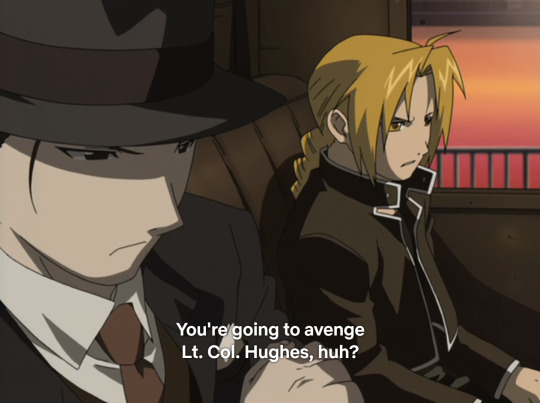
Contrast this with Arakawa’s manga and the 2009 anime, in which something so small as Roy taking initiative (to ask every homunculi if they were Maes’ killer) gives us ongoing, lasting understanding Roy hurts. Then, once Flame of Vengeance and Beyond the Inferno happen, Mustang’s reaction is far, far, far more emotional and vulnerable. He goes to emotional levels 2003 doesn’t give him. We see Roy not just cry at a funeral one time, but here completely break down into a vengeful monster. Arakawa pulls Roy into downright VULNERABILITY and HUGE emotional failings, and because of that, we audience members take away so much more about his care for Hughes. We take away so much more emotion-wise ourselves!
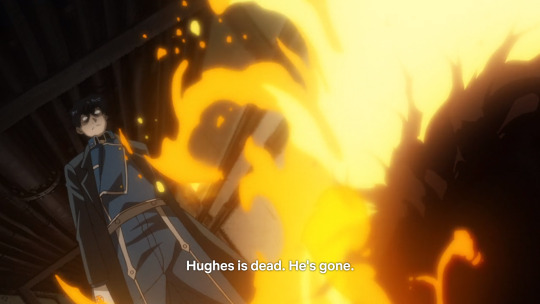
So. We see Mustang at a far more extreme emotional low in 2009. (He breaks down three times in three distinct ways during the Promised Day arc!) AND. We also see him at more extreme moments of greatness. Fighting Bradley is undoubtedly Roy’s best, most dramatic moment in 2003, and while I enjoyed it immensely, there’s something to be said that Roy’s easily more badass in FMAB by episode nineteen. Death of the Undying is a powerful, jaw-dropping, eye-widening, fist-pumping, ultimate badass moment for Roy... and he hasn’t even hit his greatest OP strides. FMAB builds the heroes up to greater, longer, more intense battles that make you root for them and shout. There’s rarely even a single shout out “Yyyeees!!!” moment for our main characters in the 2003. It’s literally not until the last episode I felt any thrill for Roy fighting.
You know how much more emotional and amazing stories are when you give us these greater highs and lows???
And that’s just ONE example. List any character, and you’ll see the same pattern. Which feels more momentous? Ed punching Envy in 2003, or Ed whaling on Father in 2009? Sure, Ed might defeat more homunculi in 2003, but don’t the fights feel so much more epic and victorious in the manga? And which Riza makes you cry more: the woman who makes one (admittedly rather agonizing!) scream for Roy, or the woman who flips out in a gun firing spree when she thinks Roy is dead, guides a blinded Mustang after getting her throat slit, and declares at one point she’ll commit suicide after executing her commanding officer? Riza’s got many more cracks, depth, vulnerability, and badass heroicism in 2009.
Our big moments are bigger in 2009. Our low moments are lower in 2009. Our casualties hurt greater. Our successes feel more monumental. This range of emotion is critical to making story dynamic. Many ideas in 2003 don’t dig out their full potential because they restrict dynamic range. We NEED our characters to be vulnerable. We feel AMAZING when they’re big damn heroes. You walk away with so much more then.

Now, part of the 2003 not having anyone be big damn heroes is because of the grimmer take. Both FMA and FMAB tackle extremely serious topics with depth. But their takeaways are different. 2003 is a lot more about how life has problems; 2009 is a lot more about how life has solutions. Both stories have problems and rewards, but there’s a skewing in how the animes handle each.
For instance, FMA 2003 digs in deep with the Ishvalan people. There is a great amount of content and interesting, nuanced material showing a minority people suffering at the hands of an unsympathetic military state. I appreciate that significantly. The story does a great job calling out the military and questioning the state for their wrong actions. The story does a great job showing what injustices a people group can undergo, and how emotionally they are going to respond to such injustices. In another part of my liveblog, I described the sense of this plot arc as, “The military is shit. They destroyed us. We have the right to be angry. You can argue we have the right to fight back.”
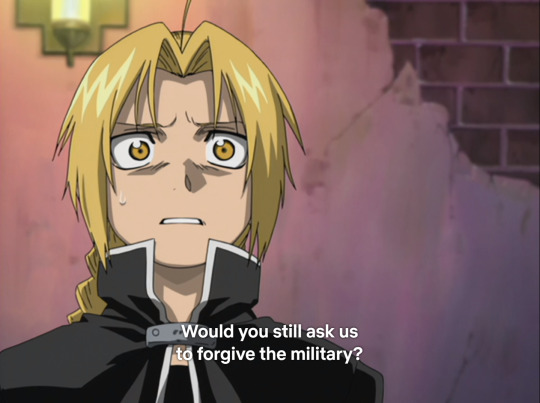
There’s a lot of truth to what 2003 says. It’s a grim concept but quite true in the workings of the world. However, while 2009 also shows us how horrifying Ishval is and how terrible the workings of the world can be, it doesn’t stop at this grim perspective. FMAB also calls out the Amestrians for baselessly killing Ishvalans; Riza points out that even if upper command gave orders and Envy started the war, she and her fellow Amestrians carried out the bloodshed with their own hands. But. FMA 2003 says, “This is bad shit and people can be shit.” FMAB 2009 says, “This is bad shit. We should fix it.”
2009′s message states, “The military is shit. They destroyed us. We have the right to be angry. But that DOESN’T mean we have the right fight back. What we need to do is work to fix the horrors of this work.”
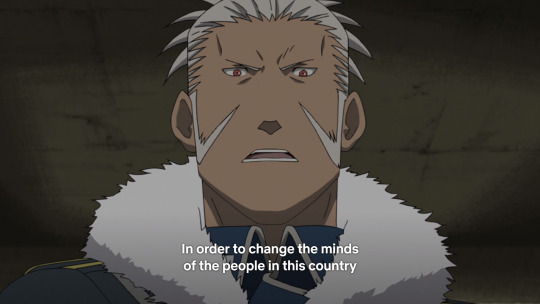
That wraps into one of Arakawa’s biggest, most widespread message throughout all of her manga, from start to end: All humans are important. All souls deserve to be treated with the utmost respect as human beings. It doesn’t matter if you’re a suit in armor. It doesn’t matter if you’re a pig chimera. It doesn’t matter what your race is. It doesn’t matter who started the bloodshed… you should be the one to end it. You are a human, human is good, and the best thing we can do is help each other. FMAB is about breaking out of the cycle of “an eye for an eye.” In 2003, Scar dies carrying out acts against the military. He doesn’t break the cycle. We understand why he responds the way he does, but it’s in 2009 that Scar and his brother become the damndest heroes in FMAB. Scar goes from someone with vengeful purpose for what the military has done to him… to trying to be the better person, the HERO, who fights back and gives back when no one else would before.
In the end, 2009 gives the Ishvalans new hope, too. It’s a lot more balanced in coming, especially as we see characters like Scar work through themselves... changing from a man taking vengeance for Ishval’s destruction, to someone working to rebuild Ishval. The Ishvalans’ return to their homeland is built up with good reason, hope, and moral messages. 2003 shows attention to the grimmer realities in how Scar’s life ends. 2009 gives us the greater perspective of growth and solutions in how Scar’s life moves forward.
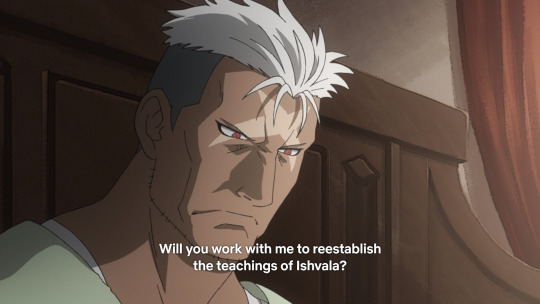
How most characters’ goals are met - or not met - is another series of instances in which 2003 comes out less optimistically. Edward Elric and Roy Mustang have an entire conversation near the end of the 2003 anime about how both of them cannot achieve their goals in the way they initially intended. Mustang planned to rise to Fuhrer by distinguishing himself in military leadership. Ed planned to find his body by working as a State Alchemist. Both of these characters abandon their plans, Mustang commenting, “Both of us are like children, trying to be faithful in living out our dreams.” There’s a good lesson to be learned in this - don’t swallow evil into your plans, but purge it, even if it means stepping away from that initial dream - but it’s also got a lot more of the less pleasant grits of reality to it, than does FMAB in its messages.
For in the end of 2003, Roy Mustang never becomes Fuhrer, is not brought up any further up in military command to seem he could achieve that goal in the future, and is in fact set further behind his goal’s progression because of his injury. He wanted to become Fuhrer “for Hughes,” decided instead to kill Bradley “for Hughes” - but the result is a battle he barely wins, an encounter with Archer that makes him lose an eye, and a scenario in which he collapses unconscious in pools of blood from his injuries. Conqueror of Shamballa may of course change this state, but currently, by the end of FMA 2003, Roy Mustang’s life position is no great momentum forward. There are some good things about what’s become of his choices. He seems to be thankful to have Riza Hawkeye around him as he’s recovering. Still. It’s a more grim reality with grim results.
FMAB and the manga show a more positive future for Mustang. It’s also not ideal, but it’s a more optimistic angle. He’s going to regain his vision - the big injury he sustained during his final encounters with the enemy. Mustang is promoted to Brigadier General fairly quickly after the Promised Day arc. Only a few years down the road from that, he’s the second most powerful man in the country. The final photograph of him at the end of Chapter 108 shows us an esteemed General Mustang. And the way Grumman talks suggests he’ll be giving the Fuhrership to Roy down the road. Instead of Roy throwing away his goal’s hard work because it was imperfect, and instead of finding himself no noticeably further in life by the end of the story, Arakawa gives us a much brighter ending for Mustang.
Even if Conqueror of Shamballa may give Mustang a little bit more of a step forward, how Edward and Al regain their bodies still hits my point hard that how characters achieve their goals, and to what extent, is grittier in the 2003. It’s more imperfect in how life goes down. Al actually uses the Philosopher’s Stone inside him in the 2003; he and Ed sacrifice their well-being for each other to try to help one another; Al returns as a ten-year-old boy with lost memories; he and Ed find themselves in different worlds; and on and on. There are a ton of unideal angles in how Ed and Al return to their initial bodies in the 2003. You’re not celebrating a great, hard-earned victory. It’s CERTAINLYy not the same sort of exciting, fist-pumping achievement we get in FMAB when Ed finds a way to outsmart Truth and carry his brother home, arms wrapped around one another’s shoulders.
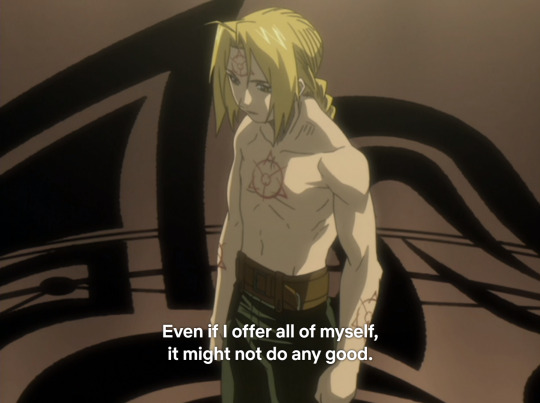
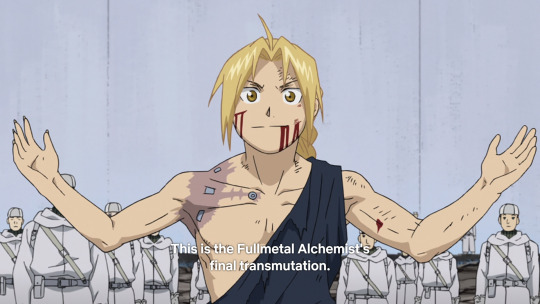
The way I like to phrase the end of FMAB is that most characters achieve 85% of their goal. There are some things that aren’t going to be ideal, and Arakawa acknowledges life isn’t ideal. Al gets Ed’s arm back but Ed will always have an automail leg. Edward Elric has to give up his alchemical abilities to return Al home. Roy Mustang has more years of work ahead of him before he can reach his goal. Ling Yao becomes Emperor, but doesn’t carry home with him an exactly immortal body. Mei Chang doesn’t become Empress, though she earns what she most wished to accomplish: secure the well-being of her clan. Winry, Ed, Al, and Mei all have wonderful relationships to grow through, too. Even though they don’t get every aspect of their goal achieved, that’s okay! It’s still the case that these characters earn through very hard work their own happy endings. These endings are more satisfying, and feel like a greater sense of accomplishment and resolution to their original goals.
2003 moreso undercuts what the characters want. What they achieve and how they achieve it is much less a sense of accomplishment, and focuses even more on the imperfections of the world around them. Ed and Al getting their bodies back isn’t a time to celebrate. It’s just another point in their long journey of trying to figure out how to make their life okay.
And we can continue looking at many more instances to see the pattern 2003 has a less optimistic spin on events. Both stories show imperfections in life, but 2003 hits that sense of imperfection harder and with less payoff to characters. Equivalent exchange and the suffering we endure in life - that’s definitely more positively spun in Arakawa’s tale than the first anime.
Even the ending words of the two anime, while both being similar in their idea, give a sense of the differing levels of focus between imperfection and inspiration:
FMA 2003: Man must pay an equal price in order to obtain anything. That is the Law of Equivalent Exchange. At the time, we believed that to be the true way of the world. But the real world is imperfect, and there was no law that could explain everything. It’s the same with the Law of Equivalent Exchange. Even so, we believe that man cannot obtain anything without paying a price. The pain that we received must have been the price we paid to obtain something. And, by paying the price of effort, everyone will certainly be able to obtain something. Equivalent Exchange is not the law of the world. That’s the promise Brother and I made to each other until the day we meet again.
FMA 2009: There’s no point to lessons that don’t bring with them pain. People can’t gain anything without sacrificing something, after all. But once you’ve successfully endured that pain, you gain a heart that is stout enough not to become overcome by anything. Yeah, a heart made of fullmetal.
Both of these endings acknowledge that we gain something when we go through pain. But in 2003, Al says that the world is imperfect and what he and his brother believed about equivalent exchange was imperfect. Al also is trying to say that he wants to step beyond the imperfect and incomplete Law of Equivalent Exchange and through that find a way to reunite with his brother. There’s a lot more focus on imperfection and the fact that life continues to bring imperfection to him. In the 2009, stating that we gain something through pain is given a more positive spin: once you do that, you can overcome everything. It’s not just that paying the price of pain will gain you a mediocre “something” - it’s that it will turn you into someone with a steel-strong heart that can overcome anything. Mentioning the Law of Equivalent Exchange in FMAB isn’t to talk about how the world is imperfect, but here it’s to say that the experiences we undergo give us a great end result. Hardcomings build our character and give us a happy ending.
There’s certainly a difference in mood between these two closing monologues, similar as they are in conceptual content. FMAB is far more inspirational.
Now. Don’t let this long analysis suggest that I think FMA lacks good quality. There are some extremely cool topics that FMA 2003 discusses in depth, especially regarding our responsibilities in war. And typically I tend to enjoy stories that acknowledge the imperfections of our experiences, and how situations never resolve in the glittery manner we imagine. However, in the case of FMA versus FMAB, I have to say that Arakawa’s story is by far more successfully emotional, satisfying, and inspirational. There has to be some payoff for characters to undergo their challenges. The way FMA 2003 is written, there is less payoff and less inspiration.
These are just some of my thoughts about how FMA 2003 is framed, and how that makes it feel in comparison to FMAB. I’ve had a hoard of fun watching the older series, and I could certainly talk about its positive sides, too. However, I think that’s enough yakking for now. These were my biggest impressions of the series before heading off to Conqueror of Shamballa.
#long post#non-dragons#fma#Fullmetal Alchemist#Fullmetal Alchemist: Brotherhood#FMAB#Fullmetal Alchemist Brotherhood#analysis#my analysis
68 notes
·
View notes